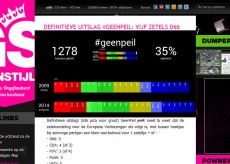 This week elections are being held for the European Parliament, a body that has become a serious democratic institution since the previous elections as a result of the Treaty of Lisbon. Yesterday it was the Dutch and English’s turn to vote. The voting will last until Sunday in the rest of the union and because of that the Dutch government has forbidden municipalities to publish their tallies until then.
This week elections are being held for the European Parliament, a body that has become a serious democratic institution since the previous elections as a result of the Treaty of Lisbon. Yesterday it was the Dutch and English’s turn to vote. The voting will last until Sunday in the rest of the union and because of that the Dutch government has forbidden municipalities to publish their tallies until then.
Shock blog Geenstijl decided to crowd source its own exit polls based on actual vote counts.
The blog called its readers to go to the polling stations and stick around for the count. Geenstijl claims that 1,378 volunteers went to the stations to witness the public vote counting. The volunteers managed to collect tallies representing 15% of all the Dutch votes.
The results are largely similar to that of the exit poll held by Ipsos for state broadcaster NOS and in line with predictions from February. Centrist party D66 (Lib-dem) is cautiously predicted to be a winner whereas extreme right-wing PVV did not deliver on its land-slide victory promise and may even have to give up one of its four seats. My personal favourite, the Pirate Party, appears to have fared better than in the recent national elections, but the 1% or 2% of the votes they seem to have received probably won’t be enough for a seat in the EP.
The European Commission threatened the Netherlands with legal action if the country were to show a love of democracy and transparency by publishing the results before Sunday and had asked Minister Plasterk what he thought of Geenstijl’s intended stunt. Plasterk uncharacteristically told the EC he saw nothing wrong with citizens using their democratic right to be at the polling stations to witness the count.
See also: Voting booth ‘stemfie’ to be contested in court
(Illustration: screenshot of Geenstijl.nl)

 Brenno de Winter needs your money to force the government to become transparent. On June 11, he will organize a benefit in Amsterdam of which the proceeds will go to this war chest.
Brenno de Winter needs your money to force the government to become transparent. On June 11, he will organize a benefit in Amsterdam of which the proceeds will go to this war chest.
Deep linking to parliamentary documents
Rumours have it (Dutch) that this slow progress is because the state has friends that it wants to share its big pie of work with, even at the cost of transparent government. I blogged about one of these friends before.
The new front-end can be found at www.geencommentaar.nl/parlando/.
Share this:
Tags: blogging, Geen Commentaar, Parlando, parliament, transparency, WWW